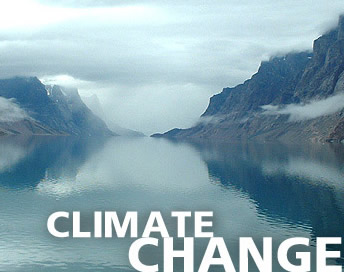 If climate change is man-made, really dangerous and will cause massive damage, this will burden insurance companies a lot. They somehow need to collect more money to pay for the new damages. What's to stop them from using your "carbon footprint" in their premium calculations? After all, people who fly a lot, drive big SUVs and have energy-guzzling homes contribute more to man-made climate change than your average tree-hugger, and coal-fired power plants are much more of a threat than photovoltaic cells on a roof.
If climate change is man-made, really dangerous and will cause massive damage, this will burden insurance companies a lot. They somehow need to collect more money to pay for the new damages. What's to stop them from using your "carbon footprint" in their premium calculations? After all, people who fly a lot, drive big SUVs and have energy-guzzling homes contribute more to man-made climate change than your average tree-hugger, and coal-fired power plants are much more of a threat than photovoltaic cells on a roof.My first concern was competition. If one company raises rates for carbon bigfoots, others could simply woo them away by offering lower rates. However, these insurers also need to collect money for an increasingly damaging environment due to a changing climate. The only other way to get this done is by raising rates for everyone equally. Carbon-conscious individuals would then have an incentive to switch to those insurance providers who respect their efforts to contribute less GHGs, plus people who do not really care about climate change per se would have an incentive to pursue a more eco-friendly lifestyle. Temporarily, this would put a strain on both business models: climate-conscious companies would primarily get low-output individuals with lower rates whereas climate-indifferent insurers would mostly get "gas hogs" whose numbers would likely be dwindling due to newly created economic incentives. With the emergence of more and more sophisticated carbon-neutral technology, there would be an incentive for an increasingly large margin of carbon bigfoots to switch to a low-output behavior, thus creating an incentive to join carbon-conscious insurers. Those companies who do not reward low-output behavior would quickly see their customer base shrink. As more and more people decide to "go green", positive effects on climate development should become visible if the theory of AGW really holds water. The profit motive alone caused a shift to carbon-neutral ways of life in this case.
Of course, social pressure could also play a role in switching to a more carbon-conscious calculation and life-style. But I left it out of the picture for a lack of deductive power.
Insurance companies are already adapting to expected changes concerning the global environment. The Munich Re Group, one of the world's largest reinsurers, for example says:
Munich Re regards climate change as a major issue and, as co-founder of the Munich Climate Insurance Initiative, is devising appropriate insurance based tools. The project targets those countries and regions which are worst affected.
Now you may ask yourself, what's the difference between a carbon tax that decreases demand for carbon-intensive products and carbon-based insurance rates that do exactly the same? If government collects the money, it may go anywhere without notice. Instead of helping the victims of climate change, this carbon tax money may as well be used to build tanks to invade some foreign nation. Insurance companies also redistribute money in a sense, but it must flow directly to those in need without too much wasteful bureaucracy or the insurer will quickly face bankruptcy due to a lack of customers. Financial punishment for carbon bigfoots by insurers would not only be a purely market-based, but also much more efficient and just solution than letting government do the job.
Plus, there'd always be the possibility of opting out. If you don't like paying more for your gas-guzzler, feel free to quit, but live with the consequences. Individuals who chose to do so would probably face many obstacles in their daily lives and even ruin should a major accident ever occur in their lives which, again, creates an incentive to participate in this "carbon scheme" instead of rebelling and denying.
Just in case climate change is merely a giant money-making scheme, this solution will also help. If there's no additional damage done by climate change and insurers just use it as a scare tactic to siphon off money, just one competitor who doesn't will suffice to lure off customers who don't like to pay more for nothing. If climate change is damaging, but human activity doesn't cause it, low rates for carbon-conscious individuals will not be sustainable. Everyone will have to pay more then, regardless of their carbon footprint.





No comments:
Post a Comment